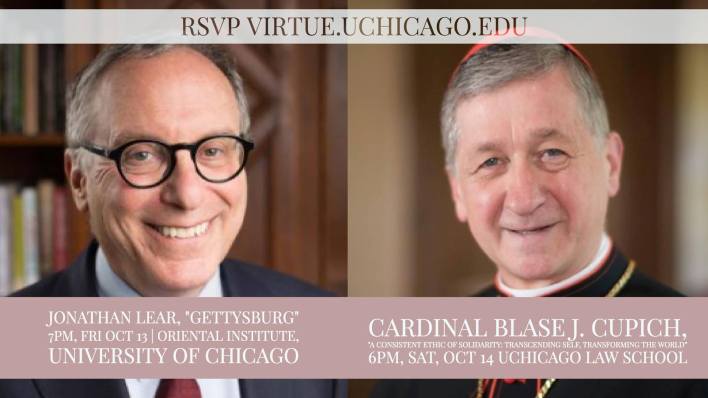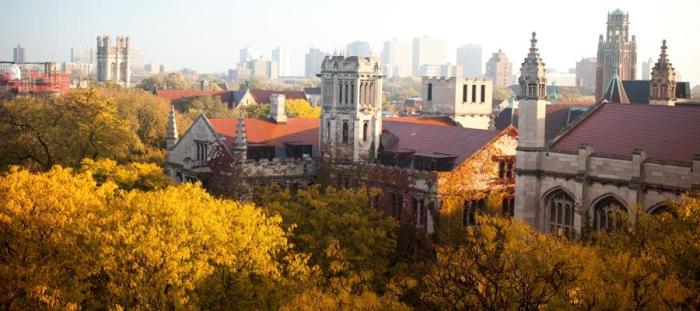
Remember to RSVP for each keynote! Jonathan Lear on October 13 and Cardinal Cupich on October 14. http://virtue.uchicago.edu/capstone-conference

Remember to RSVP for each keynote! Jonathan Lear on October 13 and Cardinal Cupich on October 14. http://virtue.uchicago.edu/capstone-conference

We’re presenting a short series of abstracts of the work-in-progress our scholars presented and discussed at their June 2017 Working Group Meeting.
David Shatz is Ronald P. Stanton University Professor of Philosophy, Ethics, and Religious Thought, Yeshiva University,
Because law plays a central role in Judaism, one initially assumes that its code of conduct is best characterized as an act morality rather than agent morality. In addition, one expects questions about proper conduct to be answered by rabbinic authorities formalistically– by derivation of the law from existing precedent laws by use of analogies. At their core, these expectations about Jewish ethics are correct. My aim in this paper, however, is to explore to what extent Jewish ethics can be characterized as well as an agent morality– that is, how, in Jewish tradition, considerations of virtue do or do not impact on norms and how they do or do not override formalistic derivations of proper conduct. The topic itself is not new, but I aim at a synthesis, analysis, and critique that is somewhat distinctive.
It must be said at the outset that Jewish tradition pays close attention to developing virtues. Indeed the literature on virtue is immense. Most famously, we have Maimonides’ work Eight Chapters, which is largely about virtue, and a section of his monumental legal code Mishneh Torah titled “Laws of Character Traits,” Medieval pietistic literature is a goldmine for explorations of character, and the Musar (translation: ethical) movement in the 19th century addressed in prodigious detail what traits are desirable and how to acquire them. Humility, faith, self-control, fear of heaven, love, kindness, compassion, altruism—these and more are foci of the huge virtue ethics literature in Judaism. The question is how this high regard for virtue, this spotlight on agent-morality, interacts with the rule-centeredness act-morality of Jewish law (Hebrew: Halakhah).
In particular, I want to show how the following theses about the law-virtue relationship appear in Jewish texts, and to explore some questions and disagreements surrounding them.
1) Some biblical laws are based on the desire to inculcate certain virtues and not on the belief that the actions proscribed or prescribed are in and of itself objectionable.
2) At times doing the right thing may diminish one’s character. (I’ll call this the problem of moral attrition.)
3) At times, doing the right thing reflects a character flaw—some right actions are such that a good person wouldn’t do them.
4) A concern for virtue expands the parameters of obligation.
5) Actions “bein adam la-havero” (=between two people, such as a giver of charity and a recipient) should not be motivated by submission to rules but rather should flow from inclinations (pace Kant).
Such claims appear in general philosophical literature, and the paper will utilize some of that material in examining the Jewish texts.

Call both one’s efforts at being a good person and the ways of thinking, feeling, and responding to circumstances that develop while one works to be a good person ‘virtue.’ Let ‘human happiness’ pick out a pattern in one’s life marked by such connected and interrelated goods as love, health, strong family ties and friendships, intellectual engagement, interesting work, a reasonable measure of material security, optimism for one’s future, and availability to experiences of joy and peace. On some traditional views, the development and exercise of good character—of virtue—is supposed to be enough to guarantee happiness. On other views, traditional and more modern, virtue and happiness can come apart. Both sorts of view share the idea that people want happiness. Both sorts of view share the understanding that acting well can be costly. In this talk, I will trace some of the tensions between virtue and happiness, urging that, while there may be no guarantee that the living will be easy when we work to be good human beings, the kinds of temporal happiness we can enjoy are only worth going for in the context of our efforts to be good people.
In this talk, I will think about bad things, and the ways in which we can apprehend and consider what is bad—both the kind of badness at issue in so-called “natural evils” like illness, injury, and some forms of suffering, and so-called “moral evils”—like injustice (with the understanding that moral evil can sometimes show itself in manmade natural evil). It can seem like both sorts of bad function completely independently of the goods that they block, impede, prevent, or otherwise sabotage. It can seem that way even if we don’t have unproblematic access to an account of what overall good might look like in the relevant area of human experience, life, or action. I will take seriously the difficulty of giving an account of all-around goodness in specific areas of life, experience, and action, and argue that, nevertheless, any understanding of badness is parasitic on a grasp—however inchoate or indeterminate—of good.


Join us for our “capstone” conference, which will feature talks, panels, and discussions with the philosophers, religious thinkers, and psychologists who have been working together to investigate whether self-transcendence helps to make ordinary cultivation and exercise of virtue a source of deep happiness and meaning in human life.
The conference is free and open to the public. For the full schedule and addresses of events, visit https://virtue.uchicago.edu/capstone-conference
Online registration for attendance at each keynote talk is separate and required (see links below).
9:15am Welcome by Principal Investigators Jennifer Frey and Candace Vogler
9:30-10:30 Kristján Kristjánsson, Professor of Character Education and Virtue Ethics; Deputy Director of the Jubilee Centre for Character and Virtues, University of Birmingham
10:45-11:45 Dan P. McAdams, Henry Wade Rogers Professor of Psychology and Professor of Human Development and Social Policy, Northwestern University
1:45 – 2:45 pm Panel: Transcending Boundaries I
Talbot Brewer, Professor of Philosophy, University of Virginia and Faculty Fellow at the Institute for Advanced Studies in Culture
Michael Gorman, Associate Professor of Philosophy, School of Philosophy, The Catholic University of America
Jean Porter, John A. O’Brien Professor of Theology, University of Notre Dame
3:00 -4:00 pm: Tahera Qutbuddin, Professor of Arabic Literature, University of Chicago
4:15 – 5:15 Panel: Virtue, Happiness, & the Meaning of Life Visiting Scholars
Fr. Stephen Brock, Professor of Medieval Philosophy, Pontifical University of the Holy Cross, Rome
Anselm Mueller, University of Trier
7pm – Keynote: Jonathan Lear, Oriental Institute, Breasted Hall | Registration required
9:00 – 10:00 am Owen Flanagan, James B. Duke Professor of Philosophy, Duke University
10:15-11:15 Angela Knobel, Associate Professor of Philosophy, School of Philosophy, The Catholic University of America
11:30-12:30 – Matthias Haase, Assistant Professor of Philosophy, University of Chicago
1:30-2:30p Panel Transcending Boundaries II
Erik Angner, Associate Professor of Practical Philosophy, Stockholm University
Heather C. Lench, Associate Professor of Psychology and Department Head, Texas A&M University
Marc G. Berman, Assistant Professor in the Department of Psychology and Director, Environmental Neuroscience Laboratory, University of Chicago
Robert C. Roberts, Professor of Ethics and Emotion Theory at the Jubilee Centre for Character and Virtues, and joint Chair with the Royal Institute of Philosophy
3:45-4:45 Nancy Snow, Director of the Institute for the Study of Human Flourishing, University of Oklahoma
6pm – Keynote, Cardinal Blaise Cupich, Law School Auditorium | Registration required
This event is made possible by a generous grant from the John Templeton Foundation.
Thank you to our conference co-sponsors: The Chicago Center for Practical Wisdom, the Committee on Social Thought, the Lumen Christi Institute, the Martin Marty Center, the Neubauer Collegium for Culture and Society, the University of Chicago Department of Philosophy, the University of Chicago Divinity School, and the University of Chicago Division of Humanities.

We’re presenting a short series of abstracts of the work-in-progress our scholars presented and discussed at their June 2017 Working Group Meeting.
Robert C. Roberts is Professor of Ethics and Emotion Theory at the Jubilee Centre for Character and Virtues, and joint Chair with the Royal Institute of Philosophy. Michael Spezio is Associate Professor of Psychology & Neuroscience and head of the Laboratory for Inquiry into Valuation and Emotion (LIVE) at Scripps College in Claremont, CA.
After living for a significant period in l’Arche communities, people often experience a change of self-other concept. It is a character change in which, from conceiving self-other in a way that is typical for modern secular societies, members’ experience of self in relation to others is transformed under the reign of what we call humble love. Both before and after the transformation, the experience of self-other has the character of concern-based construal, but the terms of the two kinds of construal are mutually contrary. Following Jean Vanier, we call the ethos guiding the first self-other style of construal “the Normal” (he writes of “the tyranny of the Normal”). The leading concepts on which this ethos turns are success, competence, competition, advancement, achievement, power, superior-inferior, rival, reputation/recognition/ acclaim, and the like, as criteria for the evaluation of persons. Here the self is seen as in relation to the other/ others, but the relations are distancing, alienating, ones of rivalry, differential competence, superior achievement, competition for power, winner and loser, etc. The relations are not those within a community, in the strict sense, but rather within a social arena of agonistic differentiation. By contrast, the terms of self-other construals that are fostered by long-term living in l’Arche are characterized by commonality, mutuality, and reconciliation: brother/sister, friend, helper, colleague, forgiveness, love. Humble love combines two highly congruent and complementary virtues: humility and charity. The tyranny of the Normal erects “walls” that impede the mutuality construals of self-other that are characteristic of love. Humility, which dissipates or undermines the distancing, alienating self-other construals, brings down these walls, making way for the genuine communion of love with its characteristic self-other construals.

Candace Vogler will give a talk September 15 at Valparaiso University as part of their programming on the theme of the pan-humanities seminar taken by every freshman, and the theme this fall is “human meaning and purpose.” She will be hosted by the Department of Philosophy at Valparaiso University.
Call both one’s efforts at being a good person and the ways of thinking, feeling, and responding to circumstances that develop while one works to be a good person ‘virtue.’ Let a ‘meaningful’ life be a life imbued with a sense of purpose or significance—a life that is full, engaging, and engaged, where the fulness comes of something more than mere subjective interest and enthusiasm. It can seem as though virtue and meaning have very little to do with each other. Whatever sort of struggle might be involved in working to be a good human being can seem like something personal—an individual quest to have a beautiful character or a shining soul. Having a meaningful life, on the other hand, looks like the sort of thing that will require that I go beyond the business of working toward having a lovely soul and into a larger world where I try to find things that are genuinely worth pursuing, and devote myself to their pursuit. In this talk, I will work to bring the two together, partly by urging a different account of virtue, partly by developing a slightly more articulate account of meaning in human life, and always by drawing on work by Thomas Aquinas.
 Our principal investigator Candace Vogler will be at Tulane University on Monday, September 18 to give a talk on finding happiness. She will be hosted by the Thomistic Institute Graduate Chapter at Tulane University.
Our principal investigator Candace Vogler will be at Tulane University on Monday, September 18 to give a talk on finding happiness. She will be hosted by the Thomistic Institute Graduate Chapter at Tulane University.
According to an ancient truism that I have no interest in challenging, people want happiness. According to more contemporary thought on the topic, in seeking love, wealth, health, friendship, adventure, something that counts as family, some sort of supportive community, interesting work, and the kinds of security associated with these things, people are seeking happiness. Alongside these goods, people sometimes take an interest goods that go beyond the stuff of personal well-being and the well-being of those in their immediate proximity. They want to be good people. They want to play the good that they enjoy forward in some area of human life. They want to work for social justice, say, or for other good causes. But according to the ancient truism that understands this human busy-ness as directed at happiness, genuine happiness shows itself in complete satisfaction. Drawing on the thought of Thomas Aquinas, I will urge that it is folly to think that a very good life will all by itself be completely satisfying. While allowing that sources of temporal happiness really are sources of happiness, I will suggest that human life points beyond itself to a kind of spiritual good that we cannot secure on our own.